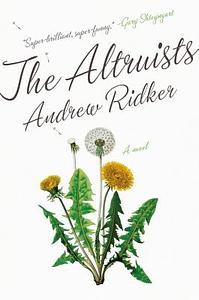Take a photo of a barcode or cover
Kind of hard to like this book since the characters are so awful, but there is a lot of realism in their portrayals. It is familiar story of a dysfunctional Jewish American middle class family, it goes back in forth in time to follow the parents: Arthur, who's wife Francine has died of breast cancer, and their adult children Maggie and Ethan. The book is funny at times, but more often cringe worthy as Arthur plots the get his children to give them their inheritance from Francine.
Best part of this was the audiobook narrator killing the key smash that happens near the end. Hats off, good sir
A very good debut.
It's well written, engaging and quite entertaining.
I liked the style of writing and the humour in this book.
The cast of characters was not really likeable but they were complex and interesting, very well written.
The plot was interesting and there's never a moment of bore.
I look forward to reading other books by this writer.
Recommended!
Many thanks to Random House UK and Netgalley for this ARC
It's well written, engaging and quite entertaining.
I liked the style of writing and the humour in this book.
The cast of characters was not really likeable but they were complex and interesting, very well written.
The plot was interesting and there's never a moment of bore.
I look forward to reading other books by this writer.
Recommended!
Many thanks to Random House UK and Netgalley for this ARC
i really wanted to like this book. it is the first time i have ever received an arc, so i was quite excited. however, i immensely disliked this book. the word choice is stiff and pompous, the writing style does not flow, and i found the characters to be insufferable.
firstly, this book is wordy in an unnecessary way. it makes it incredibly difficult to read. i’m a firm believer that books should be accessible to everyone, and i also believe that it’s a wonderful thing that there are different levels of books. every reader deserves a challenge, but this book is beyond a challenge. the vocabulary is difficult to the point of taking away from the actual plotline.
in addition to being wordy, the writing style has no flow. it feels like a brick wall of text being thrown at the reader. i had to go back and read half the pages several times before i finally absorbed what they said.
lastly, none of the characters spoke to me. i didn’t form any attachments. the author could’ve killed everyone off mid-book, and my only response would’ve been as follows: “wait? it’s over. finally!” every character felt irredeemably selfish, self important, and bland. they’re rather static.
in conclusion, i would give this book 0.5/5 stars. it just wasn't for me.
firstly, this book is wordy in an unnecessary way. it makes it incredibly difficult to read. i’m a firm believer that books should be accessible to everyone, and i also believe that it’s a wonderful thing that there are different levels of books. every reader deserves a challenge, but this book is beyond a challenge. the vocabulary is difficult to the point of taking away from the actual plotline.
in addition to being wordy, the writing style has no flow. it feels like a brick wall of text being thrown at the reader. i had to go back and read half the pages several times before i finally absorbed what they said.
lastly, none of the characters spoke to me. i didn’t form any attachments. the author could’ve killed everyone off mid-book, and my only response would’ve been as follows: “wait? it’s over. finally!” every character felt irredeemably selfish, self important, and bland. they’re rather static.
in conclusion, i would give this book 0.5/5 stars. it just wasn't for me.
Definitely worth a read. It's incredibly slow at first, and the characters are hard to connect to in the beginning because they are very much caricatures of themselves, but once you get some individual backstories the novel really hits its stride. The work you have to put into the beginning to keep reading is totally worth the interesting latter half of the book. The novel brings up a lot of good questions:
- What does it mean to be a good person, or to do good?
- Should you always strive to be good?
- To what extent does the past affect your present and future?
- To what extent can you hold your upbringing responsible for your actions and personality?
- What does it mean to be a family?
And many more. The writing overall was okay. On a high level, the general structure was all over the place (there were times when the flashbacks were choppy and jarring), but the novel had some really good one-liners and memorable, pithy paragraphs. Some of them can probably be seen as pretentious or trying-too-hard, but on the whole I enjoyed them more than I hated them.
- What does it mean to be a good person, or to do good?
- Should you always strive to be good?
- To what extent does the past affect your present and future?
- To what extent can you hold your upbringing responsible for your actions and personality?
- What does it mean to be a family?
And many more. The writing overall was okay. On a high level, the general structure was all over the place (there were times when the flashbacks were choppy and jarring), but the novel had some really good one-liners and memorable, pithy paragraphs. Some of them can probably be seen as pretentious or trying-too-hard, but on the whole I enjoyed them more than I hated them.
About halfway through, a secondary character says of the Alter family, the subject of this first novel, that they are "hopelessly self-involved." They certainly are. I have little affection for novels about dysfunctional academic families, and this is just that. All of the Alters' difficulties are trivial and self-imposed, and who cares?
I do not envy comic novelists. Besides the challenges facing any novel writer, they have to elicit a smile, chuckle or smirk from their readers at regular intervals. Then - if and when they get it right - they face the risk of seeing their work dismissed as ‘(s)light’ fare. A case in point, in my opinion, was Andrew Sean Greer’s Less, which I greatly enjoyed and which I think really did deserve the Pulitzer, but which was slated in some quarters, including by friends and reviewers whose opinion I greatly respect.
It is therefore great news that a fresh talent has now joined the ranks of comic novelists. Andrew Ridker was born in 1991 (which makes me feel terribly old), and his debut novel The Altruists is published later this year. Admittedly, on the cynicism/bleakness scale, this novel is closer to Richard Ford than to Andrew Sean Greer, which might make it more palatable to the literati. Indeed, it’s already attracting glowing advance reviews. As for me, I admired most of it, although I find it harder to actually like it.
The protagonists of The Altruists are the Alters, a Jewish middle-class family from St Louis. The mother, Francine, haunts the novel, despite being dead for most of it. Indeed, it is her inheritance which serves as the catalyst of the plot. Incensed at the fact that her sixty-something professor husband Arthur has taken up a much younger lover whilst she is dying of cancer, Francine bequeaths a secret fortune to her two children, Ethan and Maggie. Faced with the prospect of losing his girlfriend and also his heavily mortgaged house, Arthur invites his children back to St Louis for a reconciliatory weekend, hoping to convince them to bail him out.
But Ethan and Maggie have their own problems. Ethan (whose homosexuality Arthur has never quite accepted) is out of a job, and is now living off his mother’s money in Brooklyn, whilst trying to sort out his messy love life. On her part, Maggie is a hard-headed would-be altruist, whose obsession with causes and ideals often leads her to actually overlook the needs of the people who surround her. Although Arthur’s plans seem to be failing miserably (but quite entertainingly for us readers), they do lead the Alters to come to term with their history and to understand that they are possible more like each other than they like to think.
To be honest, I found it hard to symphatize with any of the characters, who are complexly drawn but seem to have few, if any, redeeming features. If likable rogues exist, Arthur Alter is certainly not one of them. And his children are, frankly, chips off the old block. This ultimately detracted from my enjoyment of the novel. At the same time, however, there is much that is brilliant about The Altruists – it is an undeniably insightful work, it has some crisply humorous dialogue, and memorable set pieces. I particularly enjoyed the final showdown between the Alters and Arthur’s young lover, and the Zimbabwe episode feels like something out of Evelyn Waugh. If this debut is anything to go by, Ridker is certainly an author to look out for.
It is therefore great news that a fresh talent has now joined the ranks of comic novelists. Andrew Ridker was born in 1991 (which makes me feel terribly old), and his debut novel The Altruists is published later this year. Admittedly, on the cynicism/bleakness scale, this novel is closer to Richard Ford than to Andrew Sean Greer, which might make it more palatable to the literati. Indeed, it’s already attracting glowing advance reviews. As for me, I admired most of it, although I find it harder to actually like it.
The protagonists of The Altruists are the Alters, a Jewish middle-class family from St Louis. The mother, Francine, haunts the novel, despite being dead for most of it. Indeed, it is her inheritance which serves as the catalyst of the plot. Incensed at the fact that her sixty-something professor husband Arthur has taken up a much younger lover whilst she is dying of cancer, Francine bequeaths a secret fortune to her two children, Ethan and Maggie. Faced with the prospect of losing his girlfriend and also his heavily mortgaged house, Arthur invites his children back to St Louis for a reconciliatory weekend, hoping to convince them to bail him out.
But Ethan and Maggie have their own problems. Ethan (whose homosexuality Arthur has never quite accepted) is out of a job, and is now living off his mother’s money in Brooklyn, whilst trying to sort out his messy love life. On her part, Maggie is a hard-headed would-be altruist, whose obsession with causes and ideals often leads her to actually overlook the needs of the people who surround her. Although Arthur’s plans seem to be failing miserably (but quite entertainingly for us readers), they do lead the Alters to come to term with their history and to understand that they are possible more like each other than they like to think.
To be honest, I found it hard to symphatize with any of the characters, who are complexly drawn but seem to have few, if any, redeeming features. If likable rogues exist, Arthur Alter is certainly not one of them. And his children are, frankly, chips off the old block. This ultimately detracted from my enjoyment of the novel. At the same time, however, there is much that is brilliant about The Altruists – it is an undeniably insightful work, it has some crisply humorous dialogue, and memorable set pieces. I particularly enjoyed the final showdown between the Alters and Arthur’s young lover, and the Zimbabwe episode feels like something out of Evelyn Waugh. If this debut is anything to go by, Ridker is certainly an author to look out for.
** Disclaimer: I received this book from the publisher in exchange for an honest review. **
This is actually a 2.5 star read. I wanted to give it a 3, but just couldn't justify it. Ridker's writing is smart and well-formulated with well fleshed out characters and good components. The feeling of the book was just too overwhelmingly gloomy for me and I couldn't attach myself to anything for a bit of a bright spot. There is a lot of family dysfunction and I guess I just need a little happiness in my reads.
For the full review: The Altruists on EPJ
This is actually a 2.5 star read. I wanted to give it a 3, but just couldn't justify it. Ridker's writing is smart and well-formulated with well fleshed out characters and good components. The feeling of the book was just too overwhelmingly gloomy for me and I couldn't attach myself to anything for a bit of a bright spot. There is a lot of family dysfunction and I guess I just need a little happiness in my reads.
For the full review: The Altruists on EPJ
The Center for Fiction First Novel Prize Submission Review #6 (pub date March 5, 2019/thanks to Viking Books for the advance copy):
Many blurbs for The Altruists note the impressiveness of Andrew Ridker’s debut novel, given his youth. I’d say this is true. The book is handily written and contains a cast of well-rendered characters. The Altruists chronicles the misfortunes of the Alter family. The matriarch, Francine, is deceased. Arthur, the patriarch, is dating a much younger woman and falling behind on his mortgage. Turns out that Francine left their kids a fortune, but Arthur wasn’t in the will. In an awkward attempt to squeeze money out of his estranged children, Arthur invites them back to the family home. The kids are Ethan, a depressed gay guy, and Maggie, a social activist who pretends to be poor for the sake of morality. As expected, none of this goes over very well.
Here’s the thing: this is technically a successful novel. It follows the standard Franzen book plot pretty well: different members of a financially well-off Jewish white-passing Midwestern family have to deal with one another over some issue of family death or inheritance. But I’ll be honest: I’m not the target audience for this book. I struggled to emphasize with these characters, especially Maggie. She’s supposed to represent a socially conscious millennial, but most of us don’t have an inheritance to rely on and can’t afford to work the low paying do-gooder jobs she does because of credit card and student loan debt. I’m sure this book will get great reviews, but it felt disingenuous to me. I’m pretty tired of these kinds of stories.
Many blurbs for The Altruists note the impressiveness of Andrew Ridker’s debut novel, given his youth. I’d say this is true. The book is handily written and contains a cast of well-rendered characters. The Altruists chronicles the misfortunes of the Alter family. The matriarch, Francine, is deceased. Arthur, the patriarch, is dating a much younger woman and falling behind on his mortgage. Turns out that Francine left their kids a fortune, but Arthur wasn’t in the will. In an awkward attempt to squeeze money out of his estranged children, Arthur invites them back to the family home. The kids are Ethan, a depressed gay guy, and Maggie, a social activist who pretends to be poor for the sake of morality. As expected, none of this goes over very well.
Here’s the thing: this is technically a successful novel. It follows the standard Franzen book plot pretty well: different members of a financially well-off Jewish white-passing Midwestern family have to deal with one another over some issue of family death or inheritance. But I’ll be honest: I’m not the target audience for this book. I struggled to emphasize with these characters, especially Maggie. She’s supposed to represent a socially conscious millennial, but most of us don’t have an inheritance to rely on and can’t afford to work the low paying do-gooder jobs she does because of credit card and student loan debt. I’m sure this book will get great reviews, but it felt disingenuous to me. I’m pretty tired of these kinds of stories.
2.5 stars. A family drama that left me wanting. For some reason, I was so bored while reading this. I’ve seen some really great reviews of this one so kept reading, but I just didn’t find it funny or interesting. For me it felt well-written but lacked emotion. The characters weren’t likable at all, and even in getting into their pasts didn’t reveal much about why they turned out the way they did. I can get behind an unlikable character, so it’s not just that, but more like a combo of unlikable and uninteresting. Just meh. Really wanted this to work for me and kept hoping it would pick up but it didn’t.





